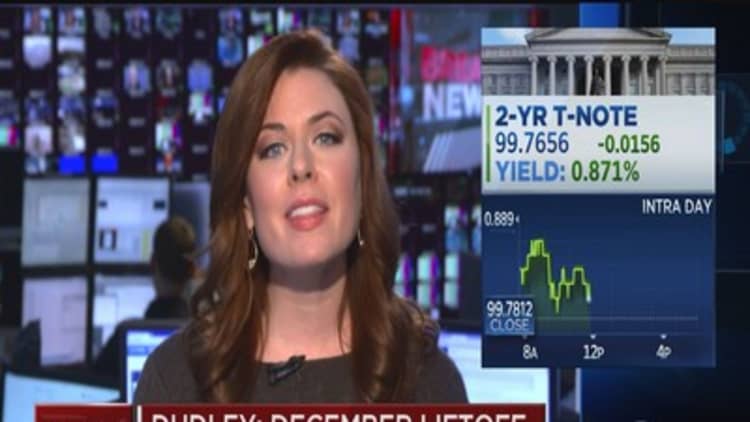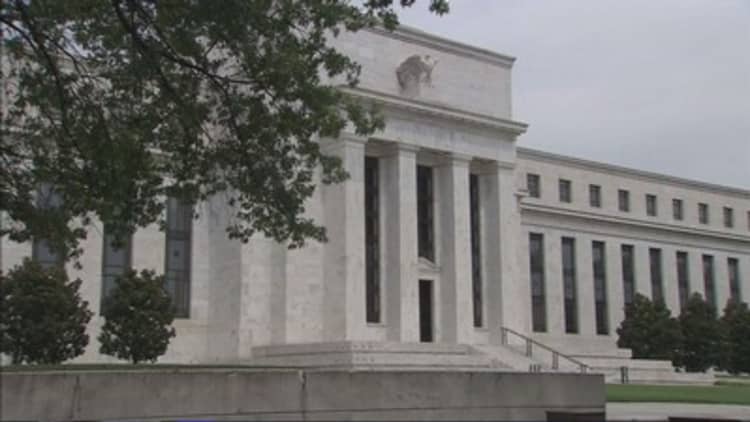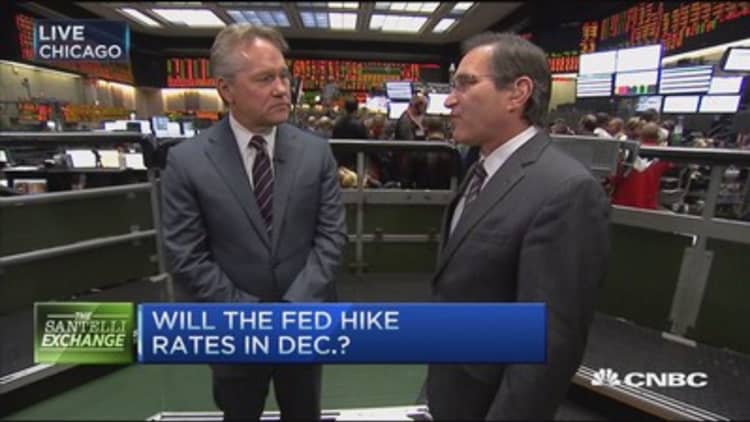



U.S. inflation should rebound next year as pressures related to the strong dollar and low energy prices fade, the Federal Reserve's second-in-command said on Thursday, adding the economy has done well reasonably well thanks in part to a delay in interest rate hikes.
Fed Vice Chairman Stanley Fischer, reinforcing previously stated confidence that more inflation was around the corner, said he expects the central bank's preferred measure to rebound to 1.5 percent next year and to hit a 2 percent goal in the "medium term."
"Some of the forces holding down inflation in 2015, particularly those due to a stronger dollar and lower energy prices, will begin to fade next year," he told a conference of researchers and market participants at the Fed Board.
"While the dollar's appreciation and foreign weakness have been a sizable shock, the U.S. economy appears to be weathering them reasonably well, notwithstanding their large effects on certain sectors of the economy heavily exposed to international trade."
Separately, the risks of the Fed moving too quickly or too slowly are nearly balanced, New York Fed President William Dudley said Thursday, pointing to a rate hike on the horizon.
Dudley, a voting member of the Fed and vice chairman of the Federal Open Market Committee, emphasized, however, that a December liftoff depends on incoming data. Echoing comments from his colleagues, he said that the pace of tightening will be "quite gradual" once the Fed begins raising rates.
The central banker said the strong October jobs report should "partially put to rest" concerns that the U.S. labor market might be faltering, adding that the country is much closer to maximum employment than it was at the start of the year.
Some labor slack remains, Dudley said, explaining that he has still not seen compelling evidence that the tightening jobs market is leading to more rapid compensation gains.
Dudley also addressed earlier concerns that global economics could impact the Fed's decision, saying the international outlook appears less problematic than it did a few months ago. Remarking after his speech that the Fed should "absolutely" consider global economics, Dudley said he had been concerned earlier in the year that developments in China and in global commodities markets could lead to wider turbulence in international financial markets.
Those worries, Dudley said, have now largely subsided, and recent data from abroad has been "generally okay." Still, he admitted, the international scene remains "an area of uncertainty" in his outlook.
Read More
On the inflation front, the New York Fed president said that, if the economy continues on its above-trend pace, then worries about low inflation should begin to recede. Core inflation, he added, should rise once transitory factors dissipate.
Dudley said he thought the fundamentals supporting U.S. domestic demand look "quite sturdy" and the housing fundamentals are solid. He did predict, however, that the trade sector will probably continue to drag on growth in 2016.
Chicago Fed President Charles Evans also spoke Thursday, saying the central bank is close to reaching its employment target, but it could be "well into" next year before the goal for inflation is reached to support a rate hike.
Once the Fed initiates liftoff, he said, an appropriate strategy would be to raise the target rate gradually.
Evans is a voting member of the FOMC, which meets next month to decide on whether to raise interest rates for the first time in nine years.
In remarks prepared for delivery to the Manufactured Housing Institute in Chicago, Evans said it could be well into next year before headwinds from lower energy prices and a stronger dollar dissipate enough to allow for sustained upward moment in core inflation.
"The outlook for inflation remains too low," he said. "A gradual path of normalization would balance both the various risks to my projections for the economy's most likely path and the costs that would be involved in mitigating those risks."
Read MoreFed's Williams: Very strong case to raise rates
"It has been dumbfounding to me," Evans later reporters after his speech, of how little the inflation outlook has changed over the past several years, even as the U.S. economy has strengthened.
While Evans expects U.S. growth of about 2.5 percent in the next 1½ years, he said housing is one part of the economy that still has a good way to go. Progress in that area, he said, has been slow and uneven.
On the other side of the equation, St. Louis Fed President James Bullard said Thursday the Federal Reserve's unemployment and inflation goals have been met, and there is no reason to continue to "experiment" with policy extremes.
Bullard, in prepared remarks, said the near-zero interest-rate policy has put the U.S. economy at "considerable risk of future inflation."
Read MoreEvans: Conditions could be ripe, but wait
Fed Chair Janet Yellen also spoke Thursday, although she did not comment on the outlook for the U.S. economy or her thoughts on monetary policy decisions.
Yellen, kicking off a research conference on policy transmission and implementation after the 2007-2009 financial crisis, said the central bank must weigh the effects of post-crisis financial regulations and new channels through which policy affects markets as it prepares to raise interest rates. She added that the Fed must also weigh the disadvantages of its actions in light of new tools meant to help the Fed raise rates.
Fed "policymakers should be mindful of new channels for monetary policy transmission that may have emerged from the intricate economic and financial linkages in our global economy that were revealed by the crisis," she said in prepared remarks.
"It is crucial to understand the effect of regulations and possible changes in financial intermediation on monetary policy implementation and transmission," Yellen added.
Read More
Richmond Fed President Jeffrey Lacker also spoke Thursday, saying he continues to hold the view that monetary policy has the unique ability to determine inflation over time. Still, he said, caution should apply to the notion that policy should respond to signals of incipient financial instability.
Monetary policy's ability to affect real economic activity can be quite limited and is almost always short-lived when well-executed, he said.
The rate hike has been stymied in part by low inflation that continues to run below the Fed's 2 percent target rate, and some policymakers have advocated waiting for more signs that inflation will rise before embarking on a path of monetary tightening.
Lacker, who has twice voted this year to raise rates when the rest of his colleagues decided to stay put, said the recent behavior of inflation "does not warrant such pessimism." But he added that the credibility of such an inflation goal "depends on the public's belief that the central bank has and will use the tools necessary to make inflation return to its goal, should that become necessary."
—Reuters contributed to this report.



